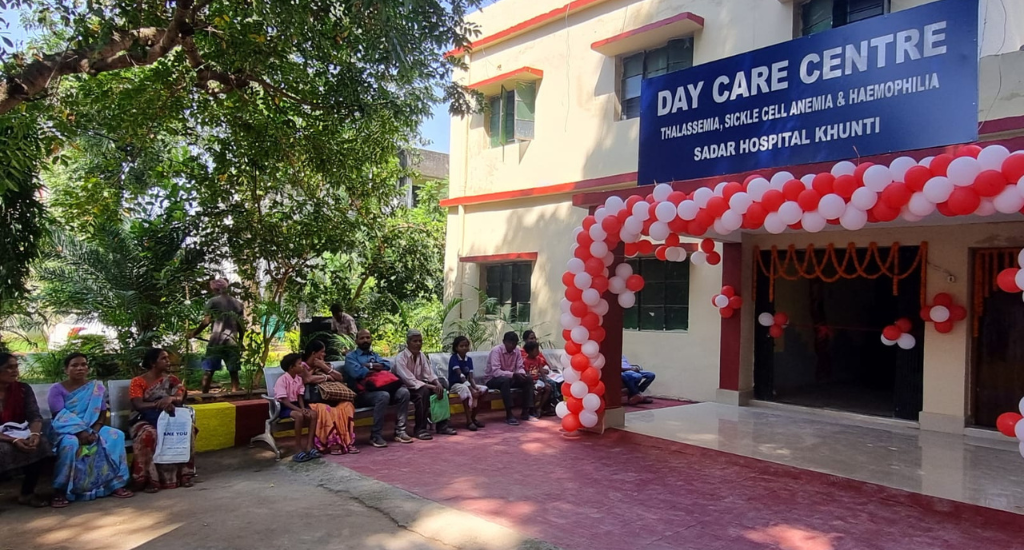There is a high prevalence of sickle cell anaemia among the tribal communities of Jharkhand. However, awareness about the hereditary disease remains inadequate. This, coupled with lack of access to healthcare, leads to low levels of treatment.
The District Health Society (DHS), which is responsible for health and family welfare, of Khunti district is taking this challenge head on through a multi-pronged approach.
How prevalent is sickle cell anaemia in Khunti?
Sickle cell anaemia is a genetic blood disorder prevalent among India’s tribal populations. It leads to anaemia and stunted growth, adversely affecting various organs such as lungs, heart, kidneys, eyes, bones and the brain.
According to the health department of Jharkhand, sickle cell anaemia is highly prevalent in Gumla, Saraikela and Khunti districts of the state. These districts have historically been malaria-endemic regions, resulting in numerous deaths. As an evolutionary response, the red blood cells of these populations developed a sickle shape as a protective mechanism against malaria, increasing their susceptibility to sickle cell disease (SCD), including alpha-thalassemia – an inherited disorder.

This protective adaptation is passed down generations, making sickle cell anaemia a hereditary disease.
Khunti district has a predominant rural population (91.54 percent), a majority of them belonging to the Scheduled Tribes (73.25 percent). Tribal groups such as Munda, Oraon, Lohra, Chik Baraik and Mahli are prone to getting the sickle cell disease.
Also Read: Weekly markets bring healthcare closer to tribals
According to the Indian Journal of Community Health report on malaria, Khunti district in Jharkhand had an annual parasite incidence (API) of 2.77 in 2018, compared to the national API of 0.32.
Challenges and intervention
Tribal communities face several challenges in treatment of sickle cell anaemia, including a lack of awareness about the disease, stigmatisation within the community and among healthcare providers, limited testing facilities, lack of standardised care and insufficient blood availability.
Patients, including children as young as six years old and adults aged up to 40 years, usually travel from remote areas for treatment at Sadar Hospital in Ranchi.

These challenges prompted an intervention by the district administration and DHS of Khunti to launch the programme, ‘From Awareness to Action: Addressing Sickle Cell Anaemia in Tribal Khunti District of Jharkhand’.
Through a collaboration with Piramal Foundation, a non-profit organisation, the healthcare company Novartis and the Ministry of Tribal Affairs, the district administration now runs the Unmukt project wherein the team tests and counsels patients. The project has so far tested 29,356 individuals, with 4.56 percent of them testing positive.
The 3Cs approach
The district administration works with a 3Cs approach involving communication, collaboration and consultation.
Also Read: Lack of basic amenities adversely affect tribal women’s health
The DHS officials, in collaboration with the Piramal Foundation, conducted block-level awareness camps for health officials, mukhiyas, auxiliary nurse midwives and frontline workers. A video and booklet were created to offer insights into the symptoms, testing and treatment of SCD. The Deputy Development Commissioner of Khunti sent letters to people’s representatives to reinforce the message.
The Khunti civil surgeon, along with a team from Sadar Hospital, Piramal Foundation and Thalassemia Foundation helped conduct training sessions for community health officers, laboratory technicians and health counsellors. The trained team members then reached out to the community, raising awareness about SCD and the available treatment facilities.

These efforts culminated in a one-day district-level mass sickle cell anaemia testing and counselling event, organised by the Khunti administration and DHS. The workshop provided medically guided testing and counselling for SCD. Additionally, block-level testing camps were organised.
Primary testing was done through the solubility test, followed by a confirmatory test, when necessary. Those who tested positive were counselled and provided with medicines.
Across the camps, 3,000-odd tests were done, with 292 individuals (9.73 percent) of them being identified as SCD positive.
Taking steps towards long-term care
The existing healthcare infrastructure in the region is insufficient to deliver comprehensive care to SCD patients. The DHS has established a 10-bed Model Sickle Cell & Thalassemia Day Care Centre at the Sadar Hospital of the district.
Also Read: How development excludes India’s tribal people

A cutting-edge blood component separation unit will complement this. It will offer essential services, including blood transfusions, vital supportive care and comprehensive counselling. It will benefit not only the people of Khunti but also those from a nearby district with a high prevalence of SCD.
DHS has signed an agreement with the Thalassemia Foundation, reinforcing their commitment to long-term, improved care for patients.
The launch of the Sickle Cell Anaemia Elimination Mission by Prime Minister Narendra Modi and the allocation of Rs 61 crore is an added vital step. This will not only identify bottlenecks but also pave the way for a comprehensive roadmap to tackle haematological diseases among the tribal population across India.
The lead image at the top shows the Sickle Cell and Thalassemia Day Care Centre at Sadar Hospital in Khunti. (Photo courtesy Information and Public Relation Department, Khunti)
Amita Yadav is a business strategist, navigating the crossroads of business, government and civil society across the globe.








